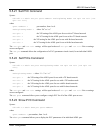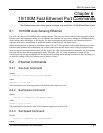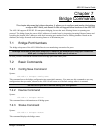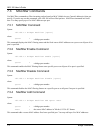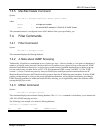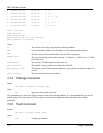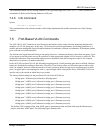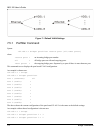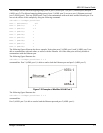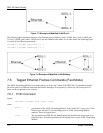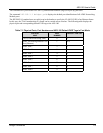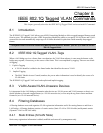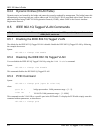
AES-100 User’s Guide
Bridge Commands 7-5
This command flushes out the filtering database of the specified bridge port. If the <port> field is omitted, this
command will flush out the filtering databases of all ports.
7.4.6 Info Command
Syntax:
192.168.1.1 bridge> info
This command shows the software number of the bridge implementation and the maximum size of the filtering
database.
7.5 Port-Based VLAN Commands
The AES-100 VLAN (Virtual Local Area Network) mechanism can be used to limit the broadcast domain to the
members of a VLAN group only. In this way, VLAN increases network performance by limiting broadcasts to a
smaller and more manageable logical broadcast domain. In traditional switched environments, all broadcast packets
go to each and every individual port.
The stations on a logical network belong to one group; however, a station can belong to more than one group. Users
of one group are not allowed to access the resources of other groups and a higher level of security is achieved. This
isolates the subscribers from one another and prevents a subscriber from discovering the resources, for example,
shared drives or printers, of another subscriber.
In the AES-100 port-based VLAN, the allowable outgoing port(s) of each incoming port must be defined. Ethernet
frames are forwarded according to these rules. Therefore, if you wish to allow two subscriber ports to talk to each
other, for example, between conference rooms in a hotel, you must define the egress port (outgoing port) for both
ports. An egress port is an outgoing port, that is, a port through which a data packet leaves. Port-based VLANs are
specific only to the switch on which they were created.
The factory default settings for the port-based VLAN of the AES-100 are:
- Bridge port 1 (Ethernet port) allowed to all bridge ports
- Bridge port 2 (ADSL port 1) allowed to bridge port 1 (Ethernet port) only
- Bridge port 3 (ADSL port 2) allowed to bridge port 1 (Ethernet port) only
- Bridge port 4 (ADSL port 3) allowed to bridge port 1 (Ethernet port) only
- Bridge port 5 (ADSL port 4) allowed to bridge port 1 (Ethernet port) only
- Bridge port 6 (ADSL port 5) allowed to bridge port 1 (Ethernet port) only
- Bridge port 7 (ADSL port 6) allowed to bridge port 1 (Ethernet port) only
- Bridge port 8 (ADSL port 7) allowed to bridge port 1 (Ethernet port) only
- Bridge port 9 (ADSL port 8) allowed to bridge port 1 (Ethernet port) only
The default VLAN settings allow each ADSL port to communicate back and forth with only the Ethernet port,
and not with other ADSL ports. The following figure illustrates this.



